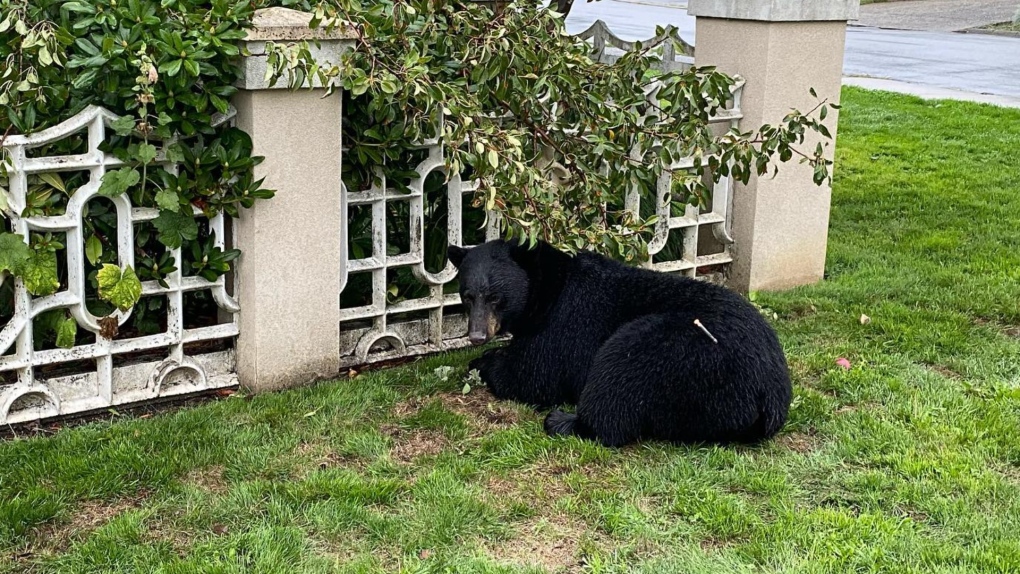Here's how many black bears were killed by B.C. conservation in September, according to provincial data
 A bear named Rufus was killed in Lynn Valley by conservation officers after it appeared to be food conditioned. (Danielle/North Shore Black Bear Society/Facebook)
A bear named Rufus was killed in Lynn Valley by conservation officers after it appeared to be food conditioned. (Danielle/North Shore Black Bear Society/Facebook)
Dozens more black bears were killed by conservation officers in B.C. last month, the latest provincial data shows.
According to statistics shared by the province this week, 142 black bears were destroyed by the BC Conservation Officer Service in September, which averages to 4.7 bears per day.
Historically, late summer tends to be busy for conservation officers in the province, but this marks the third-highest number of bears killed in September in the last 10 years.
Last month, conservation was called 5,070 times about black bears. Officers responded to 508 of those calls.
Officials estimate B.C.'s black bear population is about 120,000 to 160,000. From 2016 to 2020, an average of 494 bears were destroyed each year. So far in 2021, 378 black bears have been killed by conservation officers across the province.
ONGOING WARNINGS FROM BCCOS
In late September, BCCOS warned British Columbians about the high number of calls it was receiving.
In one day alone, conservation received 200 human-wildlife conflict calls across the province. Many of those calls related to bears and attractants, BCCOS said on Sept. 24.
"We can do better. Don’t give bears an opportunity to access unsecure attractants and create a risk to themselves and people," BCCOS said on Twitter. "Residents are reminded that with fall upon us, it is more important than ever to ensure your attractants are secured. It’s the law."
One bear killed by conservation officers had reportedly become "food conditioned," a term conservation officers use when the bear has connected people to a good source of food.
The bear was named Rufus by the North Shore Black Bear Society, which described the animal as "peaceful and trusting." The society said in a Facebook post Rufus was "encouraged with food all over Lynn Valley (in North Vancouver) and crowded by people who have silently filmed as he ate from dumpsters and fruit trees."
"He doesn’t know he should not be doing that," a message posted by the society before Rufus was killed said.
"We have been working hard to teach residents how to set boundaries from a safe place, sharing what attracts bears and always encouraging people to give our bears lots of personal space. Sadly, too many people aren’t listening to advice."
After Rufus was killed, BCCOS said in a statement to CTV News Vancouver that it was "urging the community to ensure their attractants, such as garbage, pet food and bird seed, are securely stored to help prevent bears and other wildlife from accessing them."
Tips for securing attractants are available on the province's website.
CTVNews.ca Top Stories

BREAKING Former Liberal cabinet minister Marco Mendicino won't seek re-election
Marco Mendicino, a prominent Toronto member of Parliament and former minister of public safety and immigration, won't run in the next federal election, CTV News has learned.
U.S. soldier shot self in head before Cybertruck exploded outside Trump's Las Vegas hotel, officials say
The highly decorated U.S. army soldier inside a Tesla Cybertruck packed with fireworks that exploded outside Trump International Hotel in Las Vegas shot himself in the head just before detonation, authorities said Thursday.
Wayne Osmond, singer and guitarist for The Osmonds, is dead at 73
Wayne Osmond, a singer, guitarist and founding member of the million-selling family act The Osmonds, who were known for such 1970s teen hits as 'One Bad Apple,' 'Yo-Yo' and 'Down By the Lazy River,' has died. He was 73.
Toys "R" Us Canada closing 5 stores, expand HMV and add play spaces to some shops
Toys "R" Us Canada says it is closing five Ontario stores and revamping several others as it works to "optimize" its business.
FORECAST Weather warnings issued in 7 provinces and territories
Wintry weather conditions, including heavy snow and wind chill values around -55, prompted warnings in seven provinces and territories Thursday.
The taboo of talking about money, according to one survey
Most Canadians are comfortable talking about money with their close friends and family members, but, according to a recent survey, some find it awkward to discuss finances outside their inner circle and the issue is more prominent among women.
Grieving orca mother Tahlequah carries dead baby for the second time
The famous mother orca who made waves around the world for carrying her dead calf for 17 days has suffered another tragic loss.
Rosita Missoni, matriarch of Italian fashion house that made zigzag knitwear iconic, dies at age 93
Rosita Missoni, the matriarch of the iconic Italian fashion house that made colorful zigzag-patterned knitwear high fashion and helped launch Italian ready-to-wear, has died. She was 93.
Apple to pay US$95M to settle lawsuit accusing Siri of snoopy eavesdropping
Apple has agreed to pay US$95 million to settle a lawsuit accusing the privacy-minded company of deploying its virtual assistant Siri to eavesdrop on people using its iPhone and other trendy devices.































